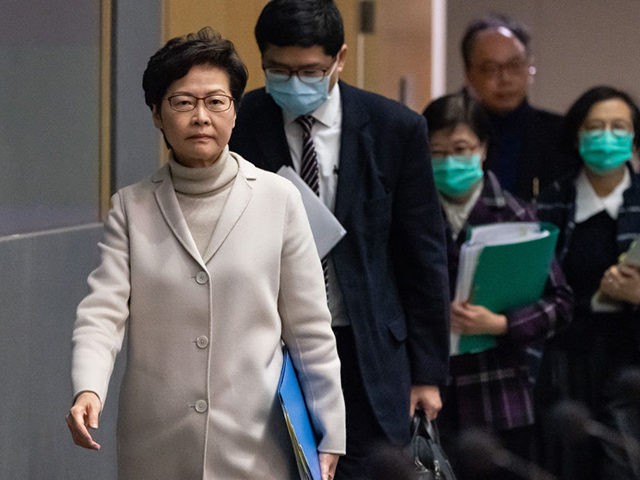Hong Kong chief executive Carrie Lam is reportedly considering a delay for the Legislative Council (LegCo) elections in September, on the grounds that a resurgence of the Chinese coronavirus makes it too dangerous for voters to gather at the polls.
The Hong Kong Free Press (HKFP) reported Tuesday that Lam is holding meetings to discuss the possibility of postponing the election, currently scheduled for September 6, after new restrictions on public gatherings took effect this week.
Several pro-Beijing lawmakers said Lam would have “no choice” but to reschedule and suggested methods for convening the legislature in October with incumbents fulfilling their duties until an election could safely be held. Some of these establishment lawmakers have recommended postponing the election for an entire year.
Opposition legislators and activists hinted that the real reason for delaying the vote is the unexpectedly huge turnout for their unofficial primary this month, which made the Beijing-controlled administration nervous about the September election becoming an unmistakable public expression of defiance.
Pro-democracy legislator Tanya Chan wrote a letter to Lam on Friday essentially daring her to demonstrate the strength of her convictions by imposing a full lockdown on Hong Kong, including a shutdown of travel from China.
“The Legislative Council election and fighting the epidemic are very serious matters and cannot be taken lightly,” Chan told Lam. “Shut the borders immediately to curb the outbreak at its source.”
Another noted pro-democracy activist and candidate, Joshua Wong, more bluntly accused the government of “using the pandemic as an excuse to postpone the election.”
Wong is resisting efforts by the Chinese Communist Party (CCP) to scuttle his LegCo candidacy on the grounds that he has a dangerous subversive or secessionist agenda. Wong responded to questions from election officials on Monday by promising to stop calling for the United States and other countries to apply sanctions against Hong Kong over the security law, but he still refuses to sign an oath of allegiance to the city government.
“When Beijing is paving way for a large-scale election ban of pro-democracy runners, the forthcoming LegCo poll in September will not be an election in the ordinary sense,” Wong warned.
Several other pro-democracy candidates have been similarly asked to “clarify” their political views, including sentiments they expressed on social media. The security law will likely make it much easier for the government to bar candidates with positions deemed “subversive” and those accused of collusion with foreign powers.
The HKFP noted that several other countries have been able to hold elections safely despite the pandemic and that Lam herself said only last week she had no plans to postpone.
British Foreign Minister Dominic Raab said during a phone call with Chinese diplomat Wang Yi on Tuesday that the U.K. would watch the Hong Kong elections “closely” and suggested China’s relationships with other nations could suffer if the elections are not held fairly.

COMMENTS
Please let us know if you're having issues with commenting.